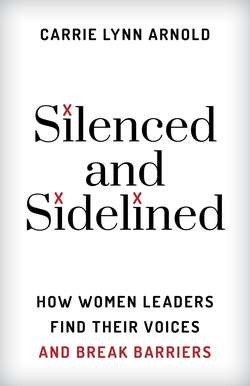Читать книгу Silenced and Sidelined - D Lynn D Arnold - Страница 19
На сайте Литреса книга снята с продажи.
The Silencers
ОглавлениеI imagine without much analysis, there are several people who come to mind as silencers. Elite players in Hollywood, politicians, and the wealthy well-connected privileged are often the accused and the convicted. It only takes a few casual glances at a news broadcast to be aware of powerful men who silence women with non-disclosure agreements, settlements, and career-limiting threats or actions.
The female leaders in my research did not describe their silencers in this same vein.
Instead, they view their silencers as sometimes intentional but mostly subtle, unknowing, but incessant. They include people, systems, and even themselves. Women experience silencing through the non-verbal opportunism of bosses or peers, primarily when they emphasize written communication over face-to-face conversations. Others may fail to give eye contact or may mock with eye rolls when they speak. Women experience the silence that separates with the silent treatment that can come in the form of people being non-responsive to emails or requests. Female leaders can be excluded from meetings by not getting invitations to attend or even worse, getting uninvited. In more extreme circumstances, silencers may be physical. They can fist-pump the table, be rough with chairs, raise their voices, or slam doors to show their disapproval.
Individuals will also silence her with verbal criticism and control. She is the recipient of dismissive comments that question her expertise based on her gender, race, or her role in the organization. She is criticized privately, publicly, and in extreme cases through random acts of nonviolent behavior—like smearing messages in satisfaction surveys or quite literally on bathroom walls. Despite her role as an executive leader, she is on the receiving end of command-and-control leadership from either her supervisor or in some cases, the board of directors. She notices everything. She sees others conspiring against her and may feel thinly harassed. At times, she will need to ward off more overt sexual advances or public shaming, but that is typically not the norm for women in executive roles. Sexual advances are more prevalent at lower levels of leadership or perhaps when she is starting her career. However, unlike lower levels of leadership, she does not always have a place to take her concerns or complaints when something unpardonable does occur.
As she navigates silencing behavior from individuals, she is also silenced by systems of privilege. Here her silencers are faceless and represent dominant male behavior demonstrated by both genders. Systems of privilege may also favor personal characteristics, like a style of leadership or affiliations that are based on preferred groups, credentials, or roles. If she has those characteristics and associations, she may experience inclusion.
It does not matter if you are five years old on the playground, the new hire in your first professional role, or an executive sitting in a c-suite—exclusion is always painful regardless of an achieved or perceived level of success.
Exclusion can also occur if her speech or patterns of communication are misaligned with the dominant discourse in her organization. Merely speaking up or out is rarely the solution as raising voice does not indicate voice efficacy and can at times increase her difficulty. Her lack of consciousness around this issue with voice is one of the first barriers she needs to address.
Her silencers are young, old, and the same age. They are same-sex, heterosexual, male, and female. They are Black and White and inclusive of all nationalities, cultures, and religions. When there is no one around to silence her, she may silence herself and further decrease her care of self. When she self-silences, she has a perceived locus of control that is outside herself. This shows up as an external threat and can cause internal fear, self-questioning, and shifts in effective leadership. She responds to that threat and fear with self-protection. She is unwilling to speak or act if it jeopardizes vital work relationships or her standing with her organization. Often, she is the breadwinner in her family and has bills, responsibilities, and a lifestyle to maintain. She may actively suppress her thoughts, believing there is no room for error or expression.
